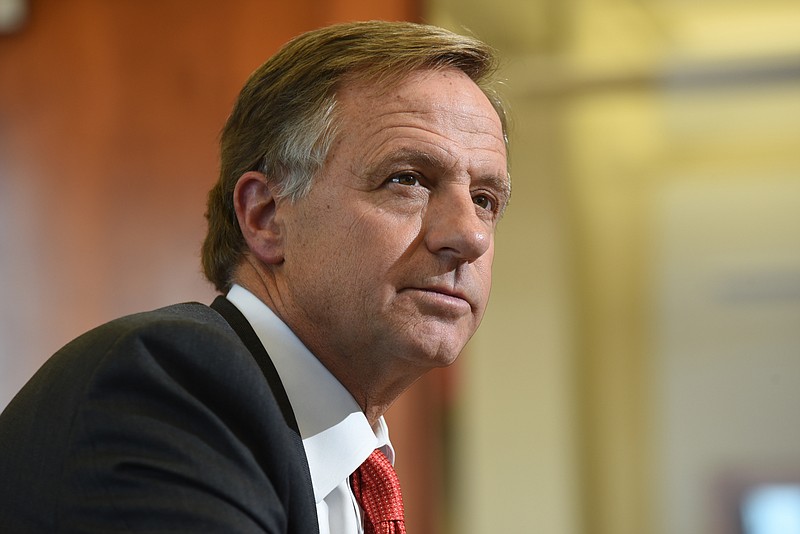NASHVILLE - Tennessee lawmakers will find themselves in an unusual situation during the 110th General Assembly that kicks off Tuesday.
Republican Gov. Bill Haslam is expected to ask the GOP-dominated House and Senate to raise gas and diesel taxes for the first time in 27 years to keep the state's roads, bridges and other transportation projects moving.
"I think everybody agrees we have to do something," Haslam said last week. "Now, the question is what."
At the same time, lawmakers are already skirmishing over how to cut taxes in other areas because of a whopping projected general fund surplus: nearly $1 billion in one-time money and about $845 million in recurring money.
The general fund pays for most state functions, from K-12 and higher education to prisons and health.
Other major issues include an expected push by Rep. JoAnne Favors, D-Chattanooga, for mandatory school-bus safety belts following the Woodmore Elementary bus crash that killed six Chattanooga children in November.
Favors said she is not ready to discuss details of the proposal yet. Rep. Gerald McCormick, R-Chattanooga, said he stands ready to join Favors in pressing the legislation.
New fights also loom in areas like Sunday wine and liquor sales, legalizing medical marijuana and a follow-through effort to last year's law allowing therapists and counselors to reject LGBT clients whose goals differ from counselors'.
This year, Sen. Jack Johnson, R-Franklin, wants to scrap the state's statutory inclusion of the American Counseling Association's code of ethics for one created at the state level.
And renewed battles are anticipated in areas like school vouchers and expansion of broadband internet access into underserved areas, as well as allowing voters to "de-annex" their property from towns and cities.
"I'm trying to work with [cities] to see if we can come up with something if we can," said Rep. Mike Carter, R-Ooltewa. He sponsored last year's de-annexation bill, which stalled last year amid municipal opposition.
But don't expect all the action to start Tuesday. That's the Legislature's organizational session.
House Speaker Beth Harwell, R-Nashville, is expected to be re-elected. Sen. Randy McNally, R-Oak Ridge, is expected to be elected Senate speaker in place of Ron Ramsey, R-Blountville, who retired.
Once that's done, lawmakers will recess until Jan. 30 for Haslam's State of the State address and the unveiling of his 2017-2018 state budget recommendations. Then they'll get down to work on Haslam's proposals as well as hundreds of bills filed by individual members.
"Certainly dealing with the budget is probably No. 1," McNally said.
Fuel tax votes will be 'close'
McNally said Haslam's to raise the state's 21.4 cent per gallon gas tax and 18.4 cent per gallon diesel tax won't be easy. The current rates include 1.4 cents per gallon to cover inspection fees.
He said keeping any rate increase low, equalizing rates for gas and diesel and making sure drivers of electric and natural-gas powered vehicles pay, too, could help.
"And," McNally added, "offsetting any tax increase with corresponding reductions" to other taxes.
Haslam has discused increases of seven to nine cents per gallon on gas and 12 cents a gallon diesel and increasing vehicle registration fees by $5, GOP legislators say. He emphasized the $1 billion in one-time money can't cover the state's transportation needs.
A Vanderbilt University poll last fall found 55 percent of registered voters surveyed would support an eight-cent gas tax increase. Among Republicans, though, just 48 percent said they could support it while 50 percent said they wouldn't.
Each penny of tax on gas raises about $30.7 million, and about $10.1 million on diesel. The Tennessee Journal estimates that of $803 million in estimated gas and diesel tax collections this year, about $285 million will go to local governments.
The state's transportation budget is $1.87 billion, including nearly $1 billion in federal funds and $33.7 million in other funding. Haslam has said there's a $6 billion backlog in approved but unfunded projects.
Meanwhile, the budget surpluses have lawmakers talking up tax cuts in areas ranging from the state's corporate 6.5 percent franchise and excise taxes to eliminating a $400 professional privilege tax that hits attorneys, doctors and other professionals. There's some talk about cutting state sales taxes.
Haslam noted last week that lawmakers already have voted to phase out the Hall income tax, which is shared with cities and counties. That's a loss of about $275 million.
Sen. Brian Kelsey, R-Germantown, wants to provide $500 million a year to local governments who will lose money from the phase-out of the Hall tax.
McNally, who for the past decade has served as Senate Finance Committee chairman, said legislators must be careful not to overcommit the state to cuts it cannot afford.
Tennessee sales taxes and corporate taxes grew more quickly than expected in two budget years, helping fuel the surplus, but sales tax growth rates are slowing, he said. Heavily sales tax-dependent Tennessee took a hard hit when the 2008-2009 recession struck.
It took years for sales taxes to recover.
"One of the concerns is that it's been about nine years since we've had a downturn in the economy," McNally noted. "Our first obligation is to make sure the budget is structurally balanced and also make sure it looks to the future as best we possibly can."
Contact Andy Sher at asher@timesfreepress.com or 615-255-0550. Follow on twitter @AndySher1.
